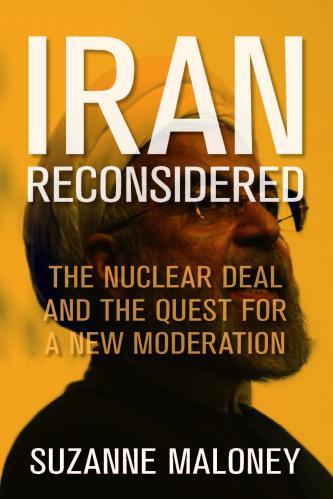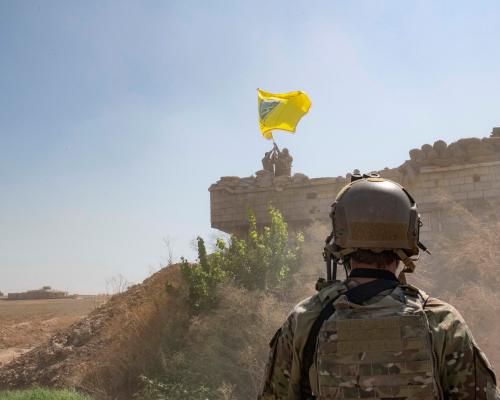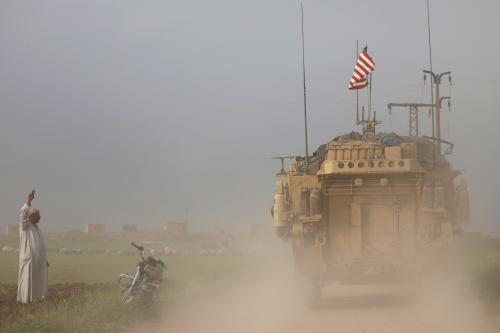President Trump’s sudden decision to withdraw U.S. troops from the Kurdish autonomous region in northern Syria should come as no surprise. In December 2018, President Trump announced his intentions to pull out from Syria as part of his bid to end “the stupid endless wars.”
And yet, the decision injected dread and uncertainty in the Syrian Kurdish minority that resides in the region — and for good reason. This disengagement amounts to an existential threat for the Kurds. Kurdish forces who operate in the region are eager to take control of “Rojava” — Western Kurdistan, as the locals call it. The most immediate threat comes from Turkey to the north, which is apparently looking forward to seizing the region and, in a page from the Iranian playbook, resettling it with 3.5 million Syrian refugees who have fled to Turkey.
At least 23 Kurdish fighters have already been killed since Turkey’s military offensive began early Thursday. The demographic implications will be devastating. From the south, a coalition of Russian, Syrian regime, and Iranian forces view the Kurdish territory as nothing less than a strategical obstacle to their security and economic aspirations.
While the U.S. decision has been denounced across the political spectrum, as well as by Pentagon officials, U.S. allies are drawing implications for the future. For Israel, the decision comes at an inopportune time as it confronts an escalating Iranian presence on its borders, which translates into a growing ability to transport weapons through Iraq and Syria to Hezbollah in Lebanon. The developments in Washington, Turkey, and Syria reveal three main lessons to Israel.
Lesson #1: We fight alone
There is no doubt that Syrian Kurds, like their compatriots in Iraq, had the most significant contribution in the fight against ISIS from 2014 to 2019. While the Syrian army was almost entirely invested in stifling the inner Sunni opposition, the Kurds were already knee-deep in deflecting ISIS. It was not until the end of 2015 that the Syrian army, jockeyed by Russia, entered the campaign — which was hanging by a thread. During these five grueling years, the U.S. relied on and allied with the Kurds, given their unflinching loyalty and common values. At that time, Turkey was hoping that ISIS would crush the Kurds. Now, the Turkish army is set to accomplish what the jihadis failed to.
The decision reverberates with other American allies who may begin to doubt the resolve of the world’s “global policeman.” In a world of conflicting interests, Israel has maintained reasonable expectations that U.S. would not fight Israel’s war, but it will safeguard its military-technological edge, supplement Israel’s budget, and deter potential adversaries. The unspoken assumption was that faced with an existential threat, the U.S. will be Israel’s last line of defense — a guardian angel. Around the Iran nuclear deal, for instance, Israelis reassured themselves that if faced with an imminent, existential threat, the Americans will be on their side.
Decisionmakers in Jerusalem ought to carefully rethink this paradigm in light of the U.S. abandonment of the Kurds. There is indeed a special relationship between Israel and the United States; at the same time, there is no better presage in the Middle East than an action that reflects the real values of an ally.
Lesson #2: The end of a “new Middle East”?
The vision of a “new Middle East” — one in which the Israeli-Palestinian conflict is resolved and most Arab countries establish formal diplomatic ties with Israel — relies heavily on the premise that the Arab world will support the reconciliation between Israel and the Palestinians and drive both sides, when the time comes, into an agreement. The cold war against Iran drew Israel and the Arab world closer to each other. With Iran as a common enemy, it was easier for Saudi Arabia and the United Arab Emirates to see the advantages of communicating and even cooperating with Israel. Furthermore, the Arab world maintained that the road to Washington goes through Jerusalem, making Israel a valuable diplomatic asset on certain issues.
But with a waning U.S. commitment in the region, potential, even limited partnerships with Israel become now less attractive. By now, Saudi Crown Prince Mohammed bin Salman and Abu Dhabi’s Crown Prince Mohammed bin Zayed realize what American isolationism really means. America will sell weapons and strike deals, but will avoid military intervention or use of force, if at all possible, to manage its risks. The light U.S. reaction to the recent alleged Iranian attack on Saudi oil infrastructure, for example, further demonstrates to the region that America will not use force to aid its allies, even in cases where its own interests are at stake.
Saudi Arabia, the United Arab Emirates, and Kuwait learned their lesson, and a policy shift is already in motion. They will seek to negotiate a deal with Iran, find a settlement, to mitigate the escalation and to keep the temperature down. Mohammed bin Salman has already sent the Iraqi and Pakistani prime ministers to mediate a compromise with Iran. Iranian Foreign Minister Mohammed Javad Zarif has already expressed his enthusiasm for “reconciliation with neighbors.” The broad strokes appear to be that Iran would keep its hands off Saudi oil export and infrastructure, in exchange for the Saudis keeping their hands off American weapons. Iran strikes two birds with one stone: retaliates for economic sanctions on the one hand, while eroding Sunni capabilities on the other. The eroding U.S. credibility gives more leeway to Iran to exert pressure using terror and to expand their regional hegemony.
This casts a shadow over recent efforts to sign a U.S.- Israel defense treaty. Striking a deal is one thing, but walking the walk is another. This is also bad news for Israel’s prospects of mitigating Iran’s nuclear program with an eroding U.S.-Arab coalition. Very soon, Israel’s number one existential threat (i.e. Iran’s nuclear aspirations) could become Israel’s direct and sole responsibility.
As the Sunni world becomes less engaged on the Palestinian issue, the prospect of resolving the Palestinian conflict “from the outside” (i.e. with Arab leaders’ support for and pressure on the Palestinian leadership) seems farther than ever. In view of the looming Iranian threat and lack of American leadership, the long-awaited “deal of the century” will find its way to the bottom of list of priorities, and again, Iran gets its way. As the Iranians exert more pressure in the Middle East and reap successes in the Persian Gulf, disillusioned Sunni Arab states are looking eastward — although they once supported the Trump administration’s 12-point demand tree, they are now looking for ways to climb down and perhaps cooperate. Overall, therefore, the chances of achieving normalization between Israel and the Arab world are very slim and the prospect of rallying their support for peace with the Palestinians is even slimmer.
Lesson #3: A new sheriff in town
The Kurdish forces are between a rock and a hard place, with the government of Bashar Assad on one side and Turkey on the other. About two years ago, Assad’s military forces threatened to cross the Euphrates river, the natural border between the American and the Russian controlled zones. They stopped short, however, out of Russian concerns that such an incursion would ignite a conflict with the United States. In light of the U.S. decision to withdraw from northeastern Syria, a potential last resort for the Kurds is to take shelter under Russian wings from the threats they face from the north and south. The price would be steep, for Moscow would insist on reinstating Syrian control over the region and Kurdish autonomy would be dismantled. Moscow would gain Kurdish support with zero effort, and the millions of dollars invested in arming the Kurds, their infrastructure, and their oil fields would fall into Russian hands free of charge.
Although the prospect of the Syrian Kurds falling under Russia protection remains theoretical, it’s not too far-fetched. Putin is an old-school leader when it comes to upholding values of loyalty and camaraderie — Assad knows that all too well. Catching the Kurds on the rebound might be an attractive option to Moscow, allowing Russia to either rescue the Kurds from Turkish claws or at least constrain them to negotiate a settlement.
As mentioned earlier, the U.S. decision to pull troops back is a major setback for Israel, particularly when it confronts unprecedented Iranian military presence in Syria and in the Middle East altogether. For Israel, Russia’s growing dominance is a double-edged sword. On one hand, it increases the probability that in the competition for Syrian resources, infrastructure, and economic benefits, Iranian aspirations will be suppressed, and Russia might gradually drive Iran from the Israeli border and from Syria altogether. On the other hand, the Russian presence in Syria has complicated Israel’s ability to implement its “campaign between the wars” — aimed at eroding Iranian and Hezbollah capabilities in Lebanon and Syria and gaining intelligence and strategic superiority in the region. Last September, Syrian anti-aircraft fire, responding to an Israeli air raid, mistakenly downed a Russian cargo plane, killing 15 crew members. Five days after the incident, the Russian defense minister accused Israel of failing to coordinate the operation. A day later, on September 24, 2018, Russia announced that it would transfer S-300 (surface-to-air) missiles to Syria, striking a major blow to Israel’s dominance over Lebanese and Syrian skies.
A stronger Russian foothold in Syria introduces major considerations for any military initiative in the region. Israel’s considerations of collateral damage, clashing interests, and threat mitigation demand more restraint and greater dependency on Russian mediation. With fewer American boots on the ground and in light of Iranian expansionism, Russia’s presence handicaps Israel’s ability to react promptly to rising threats. In addition, the potential for friction with Russia, albeit unintentional, puts Israel in another sphere of risks: Moving forward, Israel will have to intensify its coordination efforts with Russia in effort to stifle Iranian aggression. This growing cooperation will not go unnoticed in Washington. As Israel unavoidably expands its communication with Moscow, bilateral U.S.-Israel relations will be more vulnerable and complex than ever.
Yom Kippur is always a time for reflection in Israel. Of course, always a religious-spiritual introspection, but no less a time to remember the war of 1973. The Yom Kippur war is still a live wound in the Israeli psyche, a war tied to an egregious intelligence failure that almost cost Israel its existence. And so, as the Middle East takes twists and turns, Israeli decisionmakers should sink into reflection. The recent decision by President Trump might not be an earthquake in Israeli terms, but it certainly demands what Israelis call “cheshbon nefesh,” or “accounting of the soul.”









Commentary
What Israel can learn from yet another tremor in the Middle East
October 11, 2019